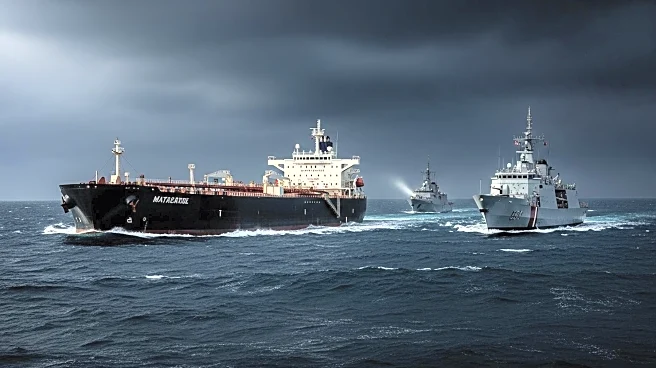What's Happening?
French military personnel have boarded the oil tanker Boracay, suspected of being part of the shadow fleet involved in the Russian oil trade. The vessel is currently anchored near Saint Nazaire, France. French authorities have initiated a probe after the crew failed to provide proof of the vessel's nationality and did not comply with orders. The French navy and other maritime authorities have not commented on the situation. The Boracay is listed under British and EU sanctions against Russia and was previously detained by Estonian authorities for sailing without a valid country flag. The tanker left the Russian port of Primorsk on September 20 and was shadowed by a French warship as it approached the French coast.
Why It's Important?
The boarding of the Boracay by French military personnel highlights ongoing tensions related to the Russian oil trade and the use of shadow fleets. These fleets, often characterized by opaque ownership and insurance, play a significant role in circumventing international sanctions. The incident underscores the challenges faced by European nations in enforcing sanctions and maintaining maritime security. The involvement of French authorities in this case may set a precedent for increased scrutiny and action against vessels suspected of violating sanctions, potentially impacting global oil trade dynamics and international relations.
What's Next?
Further investigations by French authorities are expected to determine the legal status and ownership of the Boracay. The outcome could lead to diplomatic discussions between France and Russia, especially if the vessel is confirmed to be part of the shadow fleet. European nations may consider tightening maritime regulations and increasing surveillance to prevent similar incidents. The situation may also prompt other countries to review their enforcement strategies regarding sanctions against Russia.
Beyond the Headlines
The incident raises questions about the effectiveness of international sanctions and the ability of countries to enforce them in maritime contexts. It also highlights the complexities of global oil trade, where shadow fleets can undermine efforts to isolate sanctioned nations. The ethical implications of using such fleets for economic gain, despite international sanctions, may lead to broader discussions on global trade practices and the need for more transparent maritime operations.










